Peter MALONE
Saturday, 18 September 2021 19:34
Making the Grade
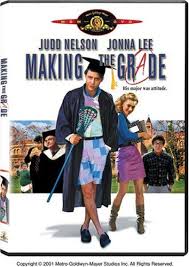
MAKING THE GRADE
US, 1984, 105 minutes, Colour.
Judd Nelson, Jonna Lee, Ronald Lacey, Andrew Dice Clay.
Directed by Dorian Walker.
Making the Grade is yet another early teenage film relying on the popular impact of such films as Porky's. Once again, it is teenage-oriented. It also has the high school setting with sexual hijinks.
However this film, is better than most. While it does have various ingredients and vulgarities from Porky's, it is not quite as crude as the other films. It also seems to steal quite flagrantly from Trading Places. Some hard rock scenes and some breakdancing, are also inserted for popular consumption.
The basic plot concerns a ne'er-do-well wealthy student looking for a substitute to take his place at college and get his diploma. A street kid on the run from money collectors takes the job. This leads to romance in school, but it also leads to a number of farcical situations and cover-ups. There are humorous scenes amongst the students, and the head of the school. Needless to say the substitute hero falls in love with the granddaughter of the school's founder. There is an irony, how ever, that as the year goes on the street kid 'becomes' a really inverted snob, alienating the heroine and poking fun at people transformed by wealth and situations and becoming pretentious. All is revealed at the end with hero and heroine going, off in a sports car with the promise that there
would he a sequel.
The film comes from the Cannon Group, popular exploiters of any trend in the 80s. The lead, Judd Nelson, went on to some better films.
Published in Movie Reviews
Published in
Movie Reviews
Tagged under
Saturday, 18 September 2021 19:34
Making Mr Right

MAKING MR RIGHT
US, 1987, 98 minutes, Colour.
Ann Magnusson, John Malkovich, Glenne Headley, Laurie Metcalfe, Ben Masters, Polly Bergen, Hart Bochner.
Directed by Susan Seidelman.
Making Mr Right is a light comical satire from Susan Seidelman, director of the low-budget Smithereens and the very popular Desperately Seeking Susan. Once again, it focuses on young people in society with an offbeat touch. However, the treatment is slight. A P.R. executive, played by Ann Magnusson, is to promote an android, Ulysses. John Malkovich (Death of a Salesman, Places in the Heart, The Killing Fields) plays the rather straight-laced scientist who invents the android as well as Ulysses, the android himself. There is some expected satire and comedy. The conclusion drawn, with a feminist touch, perhaps, is that the android had more life and personality than the human man.
Slight, comic, science fiction satire.
1. Enjoyable comedy? Satire? Focus on contemporary technology? Romance?
2. The work of Susan Seidelman? From low-budget director to Hollywood films? The feminine and feminist perspective?
3. The atmosphere of Florida, sunshine state, space developments, politics, P.R., wealth?
4. The introduction to Frankie: the clash with Steve, going to work, the, feminine comedy touches as if the heroine were inept and finally arriving to be the top executive at a meeting? Her going to Chemtec? Her meeting Jeff and their instant dislike, her seeing Ulysses? Her involvement with the project? Teaching Ulysses ? and making him emotional? Jeff’s reaction? Steve and his campaign and her dropping him? His employing Susie? The arrival of Trisha, her plight? Listening to her about her marriage break-up? Her sister getting married, her mother and the pressures for the wedding? Her growing friendship with Ulysses, his getting away, the comedy of the escape through the mall? Buying the clothes? The return? The gifts? Ulysses and his computing and buying things for Frankie? The wedding, her response to Ulysses? Don and his arrival, the satire on the soap operas? Trisha and her reaction to Don? The press conference, her going to see Ulysses? The end with Ulysses at the door? Romance? Portrait of a woman? Executive?
5. Steve and the smooth political type, his P.R. on the television, Frankie's breaking with him, his campaign, Susie, the political animal, taking advantage of every situation, his giving away the bride at the wedding, the clashes with Frankie, his growing a moustache, his taking it off for Frankie's sake, the fight with Ulysses and his still making political capital out of it? The satire on American politics?
6. Jeff as the stolid scientist, his work and dedication, knowledge, severity, his protection of Ulysses, his space dream (from the time that he was a young boy)? Going to the wedding? The encounter with Trisha and his almost melting? Sandy and her pursuit of him and then irony of her attack after the incidents with Ulysses? The press conference and his going into space because he didn't relate well to people?
7. Ulysses as the android in the image of Jeff? The technology, the humanity? The comedy of his learning, his escape, buying the clothes, the incidents in the mall, Sandy mistaking him for Jeff and the earrings, the meal and Sandy desperate? His buying spree? Hitchhiking to the wedding? The fight at the wedding? The successes of the campaign? The media taking him up?. The press conference and his answers? At the door for Frankie at the end? Technology and the male android?
8. The sub-plot with Trisha and her marital woes, Don and his sexy image on the soap operas? His coming to the wedding and the punch-up?
9. Frankie's mother, her social concerns, the wedding and her punk daughter?
10. Sandy and her coming on to Jeff, the ironic comedy and her humiliation with Ulysses?
11. Themes of modern technology? Modern politics? Relationships between men and women? Poking fun at the image of women? of men?
Published in Movie Reviews
Published in
Movie Reviews
Tagged under
Saturday, 18 September 2021 19:34
Maid to Order
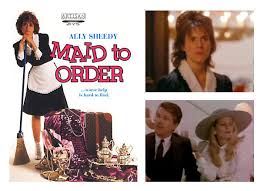
MAID TO ORDER
US, 1987, 93 minutes, Colour.
Ally Sheedy, Tom Skerrit, Valerie Perrine, Dick Shawn, Michel Ontkean, Rain Phoenix.
Directed by Amy Holden Jones.
Maid to Order is a pleasantly frothy morality fable, a reversion of Cinderella, where the fairy godmother arrives and Cinderella is relegated to being a maid. Ally Sheedy enjoys herself as a spoilt rich girl who has to earn her living in a most eccentric family with Valerie Perrine and Dick Shawn spoofing it up as newly rich agents in Los Angeles. Tom Skerritt is sombre as her father, Michael Ontkean is pleasant as the composer with whom she falls in love. Beverley D'Angelo enjoys herself as the eccentric fairy godmother.
The film was written and directed by Amy Jones (Mystic Pizza). Light entertainment with a moral.
1. Pleasant fairy tale in contemporary Los Angeles?. The reversal of C1nderella? The poor little rich girl fable? Earning one's living and earning one's self-esteem?
2. The world of the L.A. rich, of the poor, of the eccentric?
3. The musical score, rock and roll, Audrey and her singing, Nick and his composing, the songs?
4. The 'once upon a time' and 'happy ever after' framework? Audiences accepting the unreality? Stella's arrival, her type, eccentric comedy, smoking, jogging etc.? Telling the truth to Jessie? her use of magic? her dress, the washing up? Her reappearance with Charles Montgomery? At the end and her going off in the bubble?
5. Jessie at home, the spoilt brat, using and taking money, extravagance with the wine, extravagance with her friends, dancing, bored and speeding, arrested? Her father and his trying to discipline her? Her going to jail?
6. Stella getting her out, talking to her, her resentment, telling her about the job? Her wandering the streets, the gas with the bus, her being chased, hungry? Going for the job interview? Meeting with the Starkeys and the staff? Her awkwardness, meeting Nick while swimming, Audrey and Maria and their doubts, her accidents and awkwardness, the soap in the washing machine? Her father's arrival, spilling things on Stella's dress?
7. Her change of heart, friendship with Nick, going home to Audrey's, meeting Slide and seeing the LP? Changing at work, cleaning up the house, preparing for the party, friendship with Audrey, getting her to sing, the happy ending?
8. The Starkeys and their vulgarity, Georgina's stinginess, their criticisms of others, the relationship with their children, with the staff? The interview with Montgomery about the Starlight Foundation, Dude and the guests, their vulgarity with the guests, their trying to make themselves hip and modern? Spoofing of the L.A. types?
9. Charles Montgomery as nice, trying to discipline his daughter, the money, his black assistant and advice? His wish not to have a daughter? The interviews for the foundation, his presence at the end, the reconciliation, with his daughter?
10. Audrey and Maria and their work, at home, the family, the meal, taking Jessie? Audrey and singing? Her success at the reception?
11. Nick, his work as a chauffeur, mechanic, the swim, friendship with Jessie, taking her for the drive, the meal? His compositions? The concert and the finale?
12. The satire with Dude and the rock and roll star, appearance, style, career, hit by a coconut?
13. Pleasant comedy? Pleasant American fable?
Published in Movie Reviews
Published in
Movie Reviews
Tagged under
Saturday, 18 September 2021 19:34
Maids of Wilko, The/ Panny Y Wilka
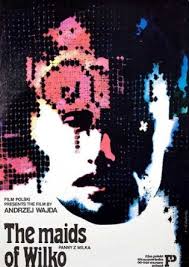
THE MAIDS OF WILKO (PANNY Y WILKA)
Poland, 1979, 118 minutes, Colour.
Daniel Olbrychski, Anna Seniuk, Maya Komorowska.
Directed by Andrzej Wajda.
The Maids of Wilko is an interesting and elegant film from celebrated Polish director, Andrzej Wajda. After completing his epic Man of Marble and Man of Iron, Wajda moved away from politics and made this film as well as Rough Treatment and The Conductor. He returned to politics with his version of Danton, filmed in France, after the experience of Solidarity, with Gerard Depardieu.
This film was based on a period novel by Jaroslav Iwaszkiewicz who appears momentarily in the final sequence with the hero on the train.
The film is set in 1929. While it is a period film, and the women of Wilko emphasise this in their manner and dress, the film harks back to the period of World War One and the regrets caused by the war. It is pre-World War Two and the Communist government in Poland. It focuses on another period instead of the periods with which Wajda was comfortable, especially his World War Two trilogy.
The film is considered a chamber piece with echoes of playwrights like Chekhov (The Three Sisters) and films by Ingmar Bergman like Cries and Whispers.
1. An interesting and entertaining film? Elegant Polish filmmaking?
2. Location photography, the sense of period? The elegance of the sets and decor? Moods and editing? The musical score?
3. The title and the focus on the women? The focus on Fela and her death? The focus on Tunia, the younger sister, the focus on the older sisters and their aunt? Their relationship with Viktor Ruben?
4. The portrait of Viktor: his work with the convent, his religious attitudes, Catholicism, Polish Catholicism? His visit to the doctor and the advice to go to Wilko? His factory? His decision to go to the country, his journey? The visit to his aunt and uncle? His meeting the sisters? The memories of Fela? His going away to the war? His learning of her death? 1929 and the memories? His realisation of the effect of the 15 years on each of the sisters? All of the sisters and their attraction for him, reality and image? Disappointments? His relationship to each of the sisters? His relationship with Tunia? His visits, going out in the country, the meals? The elegantly designed meetings and encounters with each of the sisters and moving from each to each? The party and its disaster? Her reaction to Viktor, suicide? Viktor and his farewells? His going away in the train and the encounter with the author? Portrait of a melancholic man? His experiences, self-centredness, regrets? A failed life?
5. The portrait of each of the sisters:
Julia - her relationship with her husband, his harshness, her state of health?
Jola, the separation from her husband, her flirtations and their motivations?
Zosia: her relationship with her husband, his work? as a diplomat, his absences? her studies? Fulfilment or not? Her relationship with her child?
Kazia, her age, lack of beauty, management skills, concern for their mother, her not marrying?
Tunia, her age, immaturity, romantic attitudes towards Viktor, the party, its failure, her disillusionment, wanting to Take the gesture of suicide? Her sisters' intervention?
6. The contrasting portraits of the sisters? Their being presented? for instance in the meals, the musical entertainment, in the kitchen, out at the picnic, in the fields? Their intermingling with Viktor? The comparisons with each other?
7. A portrait of Poland? Early 20th century? The past? Regrets? Changes? A perspective of the '70s?
Published in Movie Reviews
Published in
Movie Reviews
Tagged under
Saturday, 18 September 2021 19:34
Mac and Me
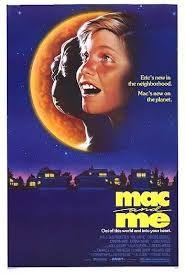
MAC AND ME
US, 1988, 95 minutes, Colour.
Christine Ebersole, Jonathan Ward.
Directed by Stewart Raffill.
Mac and Me is clearly derivative of E.T., using much of the plot but at a level for young family audiences. It was written by Stewart Raffill, director of many family films in the '70s with The Wilderness Family, Shipwreck, etc. (Raffill also directed The Philadelphia Experiment and Ice Pirates). A pleasant film for family audiences.
1. The influence of E.T., a variation on the theme?
2. California, the suburbs, scientists and technology?
3. The opening, life on the moon, the creatures, the moon rocket, going to Earth? The reaction of the scientists? The escape of the creatures?
4. The creatures and their appearance, their intelligence? Life on the moon and their memories? Mac and his escape, the van, the crash, drinking the Coca-Cola?, travelling?
5. The new home, mother and concern with her sons? Michael and his help? Erie and his personality, confined to the wheelchair? Reaction to the house, settling in and unpacking? Mac and his effect on batteries and electric goods? Transforming the house and Mother's despair, his repairing things?
6. Debbie and her Californian style, watching? Courtney and her attractiveness? The friendship between the boys and the girls? Debbie and the creature? Erie and his falling over the cliff, Mac rescuing him? The reaction of the doctor? The children believing, wanting to rescue the parents?
7. Their chasing the wheelchair, the van? The sketch of Mother, at work, at the supermarket, saving Eric? anxieties?
Published in Movie Reviews
Published in
Movie Reviews
Tagged under
Saturday, 18 September 2021 19:34
Murder or Mercy
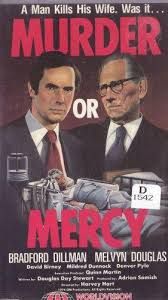
MURDER OR MERCY
US, 1974, 73 minutes, Colour.
Bradford Dillman, Melvyn Douglas, Mildred Dunnock, Denver Pyle, Robert Webber, Don Porter, Arthur Franz, David Birney, Kent Smith.
Directed by Harvey Hart.
Murder or Mercy focuses on a patient with Alzheimer’s Disease and positions about mercy killing. Robert Young gives a strong performance as a husband trying to look after his wife, her pain and his decision to shoot her. Frances Reid gives an excellent performance as the wife with Alzheimer’s Disease.
The film is geared for the wide television audience and so the treatment is very general. Nevertheless, for the popular audience, it is very strong. The film shows the life of the couple, the wife's deterioration, some of the aspects of suffering from Alzheimer’s Disease, the dilemma of the husband. It also shows the court case, the side of the prosecution and his witnesses as well as the defence. The film argues the ethics of alternatives to mercy killing and the reality of mercy killing. It is critical of the administration of the law and justice. The film was written and directed by Steven Gethers.
1. American telemovie with the social and moral issue? Broad treatment for the wide audience? Its fairness? Its making a plea?
2. The Florida settings, Spain? Apartments and Florida lifestyle? The Courts? Musical Score?
3. The opening and the shooting, the phone call, Ross and his reaction, audience judgement or not? The arrival of the police, his giving direct answers?
4. The flashback from the car: Ross and Emily in Spain, their social life, Emily beginning to forget, the outing, her pain and anxiety, their visit to the doctors, the return home, the tests, the diagnoses of Alzheimer’s Disease?
5. Emily and the portrait of a victim of the disease: the loss of memory, confusion, not knowing people, making mistakes, the ordering of the cocoa in the cafe, the pain, the curvature of the spine, wandering around, waking alone, the bewilderment, the love for her husband, her wanting to die? The inevitable decline? Ross and his support, care, the 51 years of marriage, medical advice, cleaning up after her? The decision to kill her?
6. Ross and his background, the engineer, strong character, the marriage, close to his wife, distance from his daughter? His experience, going away, Emily's bewilderment and the help of a neighbour? The decision about the shooting, the visiting of the doctor? Knowing the law? The help of the lawyer but his not collaborating with him? The explanations to the daughter? His behaviour in court, the plain and objective truth, an emotional and the jury thinking his was cold? A verdict, the effect? The strong speeches he made to the court and to the television audience? Half persuasive?
7. Joe, his defence, the law? His giving up? The lawyer and his interrogations of witnesses? The meal with his mother and her emotional plea? The jury, the interview with the juror and the reasons for the guilty verdict? The judge?
8. The sketch of the daughter, her own problems, her husbands parents, support of her father? Her dismay when she couldn't give evidence because it would be "hearsay"?
9. The friends, the witnesses pro and con? The experts? the woman with the mother and Alzheimer’s Disease?
10. The alternatives to the killing, personal, care, hospital care?
11. The facing of the issues? The reality in modern society?
MURDER OR MERCY
US, 1974, 74 minutes, Colour.
Melvyn Douglas, Bradford Dillman, Denver Pyle, Mildred Dunnock, David Birney, Don Porter, Robert Webber, Kent Smith. Directed by Harvey Hart.
Murder or Mercy is an interesting and arresting telemovie. Its subject is euthanasia. The film was written by Douglas Day Stewart who was to write such films as The Blue Lagoon and An Officer and a Gentleman as well as write and direct Thief of Hearts. They tended to be romanticised films. This one is much more realistic. It is well served by its cast: Melvyn Douglas giving dignity and credibility to the central character, the doctor who makes the decision to end his wife's life. Mildred Dunnock is the wife. Bradford Dillman is good as a lawyer and Denver Pyle, noted more for his action roles, is a crusty old lawyer, his father. The film is brief in its running time but raises many issues and dramatises them very well.
1. The impact of the telemovie? For the home audience? For interruption by commercials, a serious topic and moral consciousness-raising at the home audience level?
2. The American atmosphere of the film? For American audiences? For universal audiences? The contemporary scene of hospitals, prison, courts?
3. The credibility of the plot, the situations, characters? Exploration of moral stances, principles, emotional response? Legal issues? Judicial decisions?
4. Audience attitudes towards euthanasia, to mercy killing? The role of the patient in determining his or her own life and death? Moral obligations? The patient and choices? ordinary and extraordinary means for the preserving of life? Medical technology and its developments, impositions on human dignity? The responsibility of the person who makes the decision to terminate a life?
5. Themes of the quality of life, of existence, human dignity? The prolonging of life, the nature of death, the heart and the brain ceasing to function? Medical definitions of death? Legal definitions of death?
6. The screenplay and the points of view? An intelligent presentation of the issues? Eliciting emotional response? The situation of the patient and her not wanting to live? Her request? Her will? The doctor with his knowledge of the medical and technological situation? Reverence for life? The hospitals and the wards? The means to keep a person alive, using them or not? The criticism of a mercy killer playing God? The comment on illnesses e.g. strokes as signs from God that a life is coming to an end?
7. Lois and Paul, the initial sketch of their relationship, their mutual love, the book and the inscription? The interview with the doctor? The news about the terminal illness? Lois going to hospital, her strokes. her pain. the pact and her husband to kill her?
8. Paul as a doctor, his love for his wife, his having lectured on medicine and ethics? His grief at his wife's suffering? Hesitation? The pact between husband and wife? His turning off the machine? His withdrawing the means for her life? His comment about killing his wife? The arrest. his not wanting to defend himself, not wanting a lawyer? The end of his life with the death of his wife? Prison and his hunger strike? Sam's visit and questions? Amos and his friendship? The legal examination of the situation, especially about the nature of the will? The discussions about the plea, the discussion about diminished responsibility? Paul out on bail, his own worry, his decision to take the pills and end his life? his last minute change of mind and heart, winning Amos? The use of this last moment change in evidence against him? His fighting for his life? The experience of the trial, his disagreement with the diminished responsibility plea? His speech about belief in God, his own principles, ordinary means for preserving life? His expertise and experience?
9. Sam and the law, his relationship with his father and tricking him into interest in the case, discussing the parallels between Amos and Paul? Amos and his retirement, vegetating? Interest in the case, the plea, agreeing with Paul? Their conduct of the case? Sam's use of diminished responsibility? The attempted suicide and their coming to the rescue? The interview with medical personnel? With Dr. Peterson and his efforts to save life ~ at what cost? Amos and his speech? The plea for the right to die with dignity? The law to acknowledge this?
10. The picture of the doctors: Dr. Peterson and his admiration for Paul, his taking Sam on the tour of the hospital, his moral stance about the termination of life? The contrast with Dr. Stoneman and his belief in developments of technology, his rigorous pursuit of the saving of life (what kind of life)? The nurse and her evidence? Experts pro and con? The film's audi6nce having to make up their minds from the evidence and the speeches?
11. Ballan and his interest in the case, the conduct of the case, the clash with the Champions? His lines of interrogation and his attitude towards Paul's attempted suicide?
12. The role of the judge, listening to the evidence, to the decisions and the administration of the trial? The jury, their deliberations, their verdict? The discrepancies in law from American state to state?
13. The use of the telemovie to portray varying points of view, dramatise these, offer audience reflections on the quality of life?
Published in Movie Reviews
Published in
Movie Reviews
Tagged under
Saturday, 18 September 2021 19:34
My Left Foot
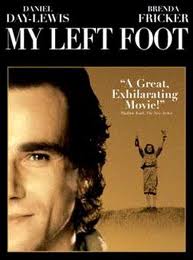
MY LEFT FOOT
Ireland, 1989, 103 minutes, Colour.
Daniel Day Lewis, Brenda Fricker, Ray Mc Annally, Fiona Shaw, Cyril Cusack, Hugh O’ Conor.
Directed by Jim Sheridan.
My Left Foot is fine film making. It is the story of Irish artist and writer Christy Brown, born of a poor and large Dublin family, with severe Cerebral Palsy. Full of feeling and sentiment (but not sentimental), the film shows Christy's tough growing up (with young Hugh O'Conor of Lamb, wonderful and persuasive as a Palsy sufferer), despite the life of his family, his discovery (and his family's) of his intelligence and his creativity.
Daniel Day Lewis (My Brilliant Laundrette, Room with a View, Ultimate Likeness of Being) is superb as the adult Christy and won an Oscar for his performance. Ray Mc Annaly ( The Mission, A Very British Coup) and Brenda Fricker (also an Oscar winner) are excellent as his parents. The screenplay does not glamorise the suffering and depression nor gloss over the physical and emotional difficulties. Lewis lived the part while filming and gives an extraordinary, award winning performance. The screenplay was co-written by the director, Jim Sheridan.
1. The acclaim of the film, awards and nominations? Deserved popularity?
2. The true story, the information given, audiences identifying with Christy Brown? The information about his marriage? The withholding of information about his death in
1981?
3. The Irish background, the presentation of Dublin, the 30s to the 50s, the worlds of Dublin? Irish landscapes?
4. The structure of the film: the opening benefit, the introduction to Christy, the framework of his being with Mary, the flashbacks, the change of moods, Mary's reading his book, the musical score?
5. Daniel Day Lewis and Hugh O'Conor and the quality of their performances, realism, audience response?
6. The introduction to Christy, the left foot, putting on the record, getting dressed and going out, his face, way of speaking? The benefit, his reaction? Meeting the Earl? His humble abode? Relationship with Eileen? introduction to Mary, interaction with her, his behaviour?
7. Mary and Christy, talk, her care, verbal fencing, Mary's ordinariness, reading the book and being interested, Christy asleep, the cigarettes, drinking the whisky? Talking, his inquisitiveness, the request for the date? Mary reading and understanding? Her hesitation, the clash, her return, the car. going out, toasting Ireland on the hilltop, literally Ireland? The marriage? The Brown's, the Irish heritage, the large family, the mother being pregnant, the poverty, Paddy at the hospital, the Cerebral Palsy, the question about the institution, butting the head of the fellow drinker? The background of the Irish families?
9. Ma and Christy, her talking to him, feeding him, pitying him, response to the palsy, watching him, his attachment to her? Pregnant, her collapse, Christy and his getting her down the stairs and kicking the door, the reaction of the neighbours, minding him, teaching him the alphabet? Their pity, thinking that he was not full-witted? The cart, the brothers playing with him in the street? The visit of the priest, first communion or not, the talk about Hell? The candles on All Souls day and the souls going to Heaven? The Halloween masks? Listening to the children doing their homework, a quarter of twenty five percent? With the chalk in his foot writing on sixteenth? The family not understanding? Laborious effort to write 'mother', the response of the family, his father's joy, going down to the pub? A growth in understanding and intelligence?
10. Age 17, the party, the candles? His age and experience, playing ball and soccer, the cold and the rubbing of the coal, the money up the chimney and the coal burning? The poverty, the eating porridge, making the family laugh? His bond with his sister her going out, watching her with her boyfriend, the pregnancy, his father's anger, his seeing this as hell, his paintings, anger and threatening to kill his father? The cold room, all the boys in the one bed? Rachel, the game of spin the bottle, the painting for Rachel, the kiss, her returning the painting? Angers and the feelings of hell?
11. Ma and her saving the money for the chair, the meeting with Eileen, Eileen's visit, the quotation about hope, empathy between the two, the ambulance to the institution, the therapy, wanting to go home, sulking, doing his work at home, physiotherapy, better movement, cure and pronunciation, Shakespeare and the Hamlet analysis? In love with Eileen? His moods, the favour for the gallery, the paintings, being up all night, the Gallery opening, his response to the speeches, going with Eileen, the meal declaration of love, anger, drinking, wanting to slit his wrists, unable to, the hangover?
12. His sulking, his Mother's reaction, deciding to make the room, mixing the cement, the building, his father and his brothers and their achievement, letting the father win? The closest that his father would come to saying that he loved his son? His father's collapse, opening the door? The break, the fight in the pub, the decision to write the book, the money and the joke about the ice cream and the joy of the family with Mother having the money?
13. The meeting with Eileen, the reconciliation, the benefit, his shyness and awkwardness his going, Eileen and her support?
14. The character of Ma, the Irish mother, pregnant, the eyes, strong, practical? Her sensitivity, her fears, saving the money for the chair? The All Souls feast and the candles, the coal and her not allowing ?it to be burnt? Her relationship with her husband, the sadness of his death, vindicated at the benefit?
15. The portrait of the Irish father, the builder, tough, putty inside, drinking, his pride, getting the sack, not wanting to be questioned in front of the children, his attitude towards Christy, how proud of his son, his angers and telling his son to shut up, tickling his son, his awkwardness at the exhibition, building the house, a sign of love?
16. The sketches of the brothers, their relationship? with Christy, their place in the house, growing up, courtship? His sister, going out, her pregnancy, the family, the photos, at the wake? The sketch of the friends and neighbours? The children? The background for Christy’s personal development?
17. Eileen, her skills, enjoying her work, helping, her love for Christy, Peter, the Gallery, the embarrassment of the party, the aftermath and the reconciliation, Peter and his support of Christy, the awkwardness of the dinner, their guests and the embarrassment, the drinking?
18. The lord, his wealth, supporting charitable causes, his speech and his reading Christy's works?
19. Christy Brown's achievement, as a role model for those who suffer, a humane portrait.
Published in Movie Reviews
Published in
Movie Reviews
Tagged under
Saturday, 18 September 2021 19:34
Murder By Night
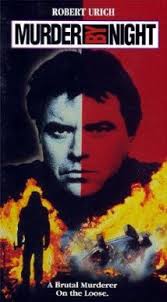
MURDER BY NIGHT
US, 1989, 100 minutes, Colour.
Robert Urich, Michael Ironside, Kay Lenz, Jim Metzler.
Directed by Paul Lynch.
Murder by Night is an entertaining whodunit telemovie. It relies on amnesia but then has an interesting twist (even if it is far fetched). The possibilities for the murdered are fairly limited and go according to audience expectation except that a twist in identity is not anticipated. The mystery is established, more mysterious events are piled on each other, sympathetic characters are not sympathetic, antagonistic characters are more sympathetic and then there are the dangerous explanations and all ends clearly.
Robert Urich is believable as the amnesia victim and witness to a murder. Kay Lenz is the police psychologist, perennial screen villain Michael Ironside is, this time, a policeman (though with sinister touches.) Jim Metzler is the engaging and helpful neighbour. One to tantalise the imagination.
1. Interesting and entertaining murder mystery? Character drama? Police investigation?
2. New York city, by day and by night? The subway, the sinister streets? Fashionable restaurants? The police precincts? The musical score and atmosphere?
3, The title, no mystery here?
4. The opening: The woman pursued, the murderer, her taking the car, the crash? The brutality? The disguised murderer? The amnesia victim and his seeing the murder, hurtled in the explosion and losing his memory?
5. Robert Urich as the amnesia victim? In hospital, unable to remember, interviewed by Madsen? His identity. returning home? The fashionable apartment and its sculptors? His being a recluse, his owning the fashionable restaurant but receiving the books at home and never appearing there? His friendly neighbour and the help? Karen as the police psychologist? Her working with him, trying to evoke memories? Their work together, going out, going to his restaurant and his not being recognized except by name? The affair? The nightmares, the imagination of the murders and they're happening? The man falling to his death on the subway? His being interrogated, the pressure from Madsen? His relief in thinking that the murderer was arrested after he pursued him and his being
just released from the mental institution? His going for help to his neighbour? The discovery of the truth and the dangerous confrontation? The drugged water, the neighbour and his explaining how he had drugged him, fed him the stories of
the killings? The irony of his true identity? The fight, the neighbour falling to his death, the threats to Karen? The violence to Madsen? The happy ending and his finding his true identity?
7. Karen, her skills, police work, investigations, working with the victim? Going to the restaurant, the affair? Her relationship with Madsen, their marriage, the break-up, his jealousy? Her suspicions, her being held as hostage? Her being rescued?
8. Madsen, the relentless police investigator, interrogating the victim in the hospital? Surveillance of Karen? Jealousy, accusations, tough stances? His being attacked? Relenting in the hospital?
9. The friendly neighbour, looking after the apartment, bringing the material home from the restaurant? Helping out? Explaining the identity? The iron of the truth, the changing of identities, the violence of the murders, his madness? His pretending to be a journalist? The recluse with the restaurant as his cover? Attacking Madsen, Karen as hostage, the victim not affected by drugs but pretending and overcoming the murderer?
10. The victims, the method? from the restaurant? The restaurant staff and their relationship with the owner? The police? The man from the asylum and the copycat murders?
11. Popular ingredients for entertainment, story, characters, mystery, unravelling?
Published in Movie Reviews
Published in
Movie Reviews
Tagged under
Saturday, 18 September 2021 19:34
Murder at the Blue Gay/ Delitto al Blue Gay
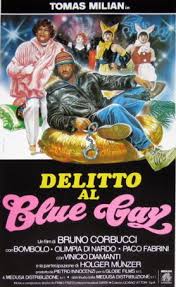
MURDER AT THE BLUE GAY (DELITTO AL BLUE GAY)
Italy, 1985, 96 minutes, Colour.
Tomas Milian.
Directed by Bruno Corbucci.
Murder at the Blue Gay is an example of popular Italian entertainment of the 80s. It is very much for the home market and shows the reliance on the trends from overseas movies, especially interest in the world of homosexuals and transvestites. The film seems to have been made up as it goes along, showing musical numbers by Les Girls type of entertainers, a sudden murder without much preparation (or clues for motivation). The police investigation is scarcely believable with Tomas Milian (star of many Visconti films and filming in the US during the 80s with such films as Revenge, Cat Chaser, Havana).
He goes into the gay world as an undercover agent, using a transvestite friend as a contact. His wife is having a baby when he is called out to the investigation, he pretends to be overseas in New York, she discovers him at the club and the marriage is about to break up. The film focuses a lot on the transvestites and stereotypes them considerably, Italian style. It turns out that the murderer is a Russian agent, all kinds of connections with the KGB (including a visit to Berlin) as well as to a film set bring the plot to a solution, without much preparation at all. The film relies on a lot of corny humour, buffoonery and stereotypes. It is an example of how popular Italian cinema handled the gay movement of the 80s.
Published in Movie Reviews
Published in
Movie Reviews
Tagged under
Saturday, 18 September 2021 19:34
Mr Music
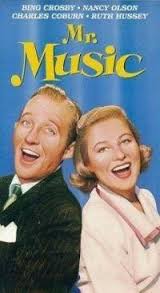
MR MUSIC
US, 1950, 110 minutes, Black and white.
Bing Crosby, Nancy Olsen, Charles Coburn, Ruth Hussey, Robert Stack, Tom Ewell, Richard Haydn, Groucho Marx, Marge and Gower Champion, Peggy Lee, Dorothy Kirsten.
Directed by Richard Haydn.
Mr Music is an easy going Bing Crosby vehicle of 1950. After his popularity as a crooner in the 30s and his moving into acting, more seriously, in the 40s (Oscar 1944 for Going My Way), Crosby was able to combine acting and singing in light entertainment vehicles. Films at this time include Riding High, Here Comes The Groom, Just For You.
Nancy Olsen was a reliable contract actress at Paramount at this time and appeared with many of the leading stars. Charles Coburn was always engaging and jovial on screen. Ida Moore gives one of her frequently amusing tipsy performances and there are guest spots from Peggy Lee, Groucho Marx and opera singer Dorothy Kirsten. The film was directed by actor Richard Haydn who appears as the eccentric benefactor for the musical (a variation on his performance as the busybody in Sitting Pretty). A sprightly Robert Stack appears as the athletic hero. Nothing particularly new, the light touch given to a reworking of Accent on Youth (which was to be remade later in the 50s as But Not For Me with Clark Gable, Carol Baker and Lilli Palmer).
1. Engaging Bing Crosby vehicle? Light dramatic comedy? The music? 50s Style?
2. Black and white Photography, the world of the university, of New York, of Broadway? The Musical numbers and their style of the times? Staging and choreography and the dancing of Marge and Gower Champion?
3. The title, Bing Crosby, the musical that his character was composing? A remake of Accent on Youth?
4. Bing Crosby's screen style and presence? As Paul Merrick, lazy, playing golf, not writing music? Alex's anger with him? Attempts to persuade him to work? Going back to the Alma Mater, the welcome for Jeff? Meeting Kate and her speeches? The performance of his numbers and the ironic tribute to Jeff in the middle? His return to New York? Alex's shrewdness, hiring Kate as a secretary, binding Paul with a contract? Paul's reluctance, antagonism towards Kate? Her strict control of him, signing the cheques? His meeting Lorna and dining out with her, the proposal? The discussions with Kate, getting lyrics, toying with songs? His trying to escape her clutches? the golf game and his butler and Kate preventing him winning the bet? His creditors after him? Alex and his disappointment? The writing of the songs and the effect of Kate on him? His meeting Aunt Amy and their discussions? Jeff and his turning up, taking Kate out? Paul acting as a benevolent father figure? The prospect of the musical, the backers pulling out? Aunt Amy’s friend and his giving $300? The performance for the possible benefactors ~ and Dorothy Kirsten, Grouch Marx? Aunt Amy's friend coming up with all the money? The happy ending, Lorna and her engagement ring ~ giving it to Kate? Jeff being free of Kate? The happy romantic ending? The age difference and the screenplays comments on it?
5. Alex, the old Broadway producer, friendship with Paul, cantankerous with him because of his laziness? The idea of the contract, the supervision? Kate reporting to him? The prospects of the money, the pullout? Aunt Amy's friend, the benefit? Gaining the money and the show going on? His summing up of the happy Broadway career?
6. Kate, serious, at the University? Her control, speeches. persuading Paul to sing? Accepting the job, taking it seriously, her supervising Paul's life? Staying in his apartment with Aunt Amy? Falling in love, reasoning herself out of it? Her attention to him. the golf game, the lyrics, the music? Unable to sleep and listening to him? Aunt Amy and confiding in her? Jeff's visit, high hopes, his not being interested in her? Wanting time off? The success of the performance, getting the money? Lorna and the breaking off of the engagement, giving her the ring ? and the happy ending?
7. Jeff, the welcome home, the college hero? His continually doing exercises? Coming to New York, taking Kate out, the unsuccessful evening? Being in training? His lack of success, blaming Paul? Breaking free of Kate, his success and one armed push ups at the end?
8. Lorna, her glamour, in love with Paul? Wanting to marry money, the engagement, the clashes? Her return to Paul's apartment, the proposal? The buying of the ring? Her change of heart? Giving Kate the ring?
9. Aunty Amy, the chaperone, the ironic touches about her marriage, giving advice, Paul thinking she was in love with him? Being tipsy? Her friend and urging him to give the money? The eccentric friend, his not giving anything away in his pinched expression? Listening to the music, $300? Giving the whole sum?
10. Guest spots from Peggy Lee singing with Bing Crosby, Groucho Marx and Dorothy Kirsten also doing duets? 11. The popular entertainment of 1950?
Published in Movie Reviews
Published in
Movie Reviews
Tagged under